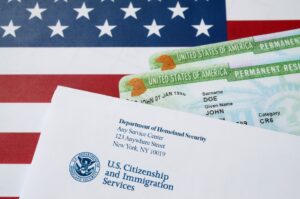If you have loved ones living outside of the United States, you may want to start the process of filing a U.S. citizen family petition. This is a common option for parents who have children outside of the U.S. as well as for grandparents who want to bring their grandchildren to the United States. However, there are specific challenges you may face when going through this process, especially if you are a grandparent. Here is everything you need to know about petitioning for a family member and how a grandparent can petition for a grandchild.
Can a Grandparent Petition For a Grandchild’s Immigration?
If you are a grandparent living in the United States, you may want to bring other family members to the U.S. so that they can also gain citizenship. The downside to this is that immigration laws are very strict about family sponsorship and include a variety of limitations that may impact your situation. Because of these limitations, you cannot sponsor a grandchild for entry into the United States.
The USCIS allows parents to sponsor their children so that they can come to the U.S. and get a green card. However, this does not extend to grandchildren, so a grandparent cannot act as the direct sponsor for a grandchild’s immigration.
Like most areas in immigration law, there are always exceptional cases where a grandparent may be able to sponsor their grandchild. These situations would usually have to fall under the category of extreme family hardship or humanitarian reasons, and extensive evidence would be required.
Alternative Family Petition Options For Grandchildren
Form I-130 is the standard avenue that many family members take when they want to sponsor a loved one so that they can come to the United States. For you to act as a sponsor when filing form I-130, you have to either be a green card holder or a U.S. citizen.
If you are a green card holder, you can sponsor spouses and unmarried children who are under the age of 21. If you are a U.S. citizen, you can sponsor spouses, siblings, parents, and unmarried children under the age of 21. Unfortunately, whether you are a green card holder or a U.S. citizen, grandparents cannot directly sponsor their grandchildren.
Although you may not be able to use the standard form I-130 petition for a grandchild, there are other options grandparents can look into so that they can get their grandchildren to the U.S.
Sponsor Your Child
The best way to bring your grandchild to the United States with a U.S. citizen family petition is by sponsoring your child directly. Even though grandparents cannot directly sponsor a grandchild, family immigration law does allow you to sponsor your child. If you go through this process and your child becomes a permanent resident or a U.S. citizen, they can later sponsor their own child and bring them to the United States.
Alternatively, you could wait until your child turns 21 or marries, which could grant your grandchild more immigration options to the U.S.
Look Into Derivative Beneficiaries
Your grandchild may also qualify as a derivative beneficiary during the immigration process. A derivative beneficiary is an alien who cannot be directly petitioned for but can follow-to-join or accompany the original beneficiary. The derivative beneficiary has to be petitioned for by either a permanent resident or U.S. citizen as part of the primary beneficiaries form I-130.
Derivative beneficiaries can be a spouse or child and can be named in the same visa petition as the primary beneficiary. If your grandchild qualifies as a derivative beneficiary, they can either enter the U.S. at the same time as their parent or they can follow to join them after six months.
In most cases, a grandchild won’t qualify as a derivative beneficiary, but it is worth looking into for more unique cases.
For assistance understanding your options when petitioning for a grandchild, you need to hire an immigration attorney. An attorney will have extensive experience and can help you find the best alternative option to bring your grandchild to the U.S.
Nonimmigrant Visas
A temporary option that may allow your grandchild to come to the United States is a nonimmigrant visa. There are different categories of nonimmigrant visas, and you need to choose the nonimmigrant visa for tourism. This visa is temporary and will have a date that requires your grandchild to return to their home country.
Depending on the age of your grandchild, they may also want to use a nonimmigrant visa for students to attend school in the U.S.
Family Petition Requirements
If you want to move forward with a U.S. citizen family petition, you need to understand what the USCIS will require during the filing process. Some of the most crucial steps in this process will be providing the proper documentation to prove that you are eligible as a sponsor and that the person you are sponsoring is also eligible for immigration.
You will need to provide evidence that the relationship is legitimate to qualify for family immigration, this includes providing required documentation such as:
- Proof that you are a U.S. citizen or green card holder.
- Proof that the relationship is legally valid.
- Proof that the relationship is not fraudulent.
- Proof of the nationality of the beneficiary.
- Proof of any name changes of the sponsor or beneficiary if applicable.
If you are sponsoring your child so that they can later bring your grandchild to the United States, you will need to provide a copy of your child’s birth certificate as proof of the relationship.
Something to keep in mind is that the family immigration process can be quite lengthy, often ranging anywhere between 11 months to 40 months. This will be dependent on whether the beneficiary is an immediate relative, if you are a U.S. citizen or green card holder, and where the sponsor and beneficiary are living.
Hire an Immigration Attorney Today
Are you wondering if a grandmother can petition for a grandchild? Contact us today at U.S. Immigration Law Counsel at 800-666-4996 to speak with an immigration attorney about your situation. We will deal with the government, so you don’t have to!




